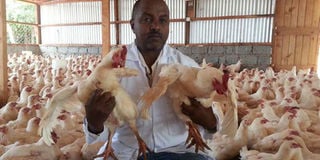Why I sell my broiler chicks in Tanzania and Uganda

Charles Gitata in his poultry farm in Nyeri. PHOTO | BONIFACE MWANGI | NATION MEDIA GROUP
What you need to know:
- His business has grown since then, expanding particularly after he started breeding and rearing broilers for hotels and lodges.
- For the chicks, Gitata, who holds a Diploma in Poultry Management from Harper Adams Agricultural Collage in London, says high demand and good prices in Tanzania and Uganda have made him explore the markets.
- A farmer is required to have an import permit from the importing country and export licence from the Ministry of Livestock and Fisheries to sell the chicks in the countries.
Some cluck, others flap their wings or feed from the troughs, while the rest laze about in the chicken coop on the five-acre farm in King’ong’o, Nyeri.
Farmer Charles Gitata opens the door of the poultry house measuring 54 by 130 feet, one of the five he has.
The birds, kept under the deep litter system and are of the broiler breed, mob him as he adds feeds in the tube feeders.
The farmer rears the broilers for meat, which he sells to hotels, and hatches chicks for clients in the neighbouring countries.
In a week, he produces more than 15,000 broiler chicks from his breeding stock (broiler breeders), which comprises of 3,400 hens and 300 cockerels.
“My incubator has a capacity of 30,000 eggs. I sell 80 per cent of all the broiler meat to hotels, lodges and households in Nyeri and Nairobi counties at between Sh270-Sh300 per bird.”
For the chicks, Gitata, who holds a Diploma in Poultry Management from Harper Adams Agricultural Collage in London, says high demand and good prices in Tanzania and Uganda have made him explore the markets.
In Tanzania and Uganda, the farmer sells his broiler chicks at Sh75 while in Kenya, the same goes for as low as Sh40.
“I thank it all to my wife Saida Juma who has several friends in Tanzania. She was instrumental in helping me focus on the two countries by getting me my first customers as prices in the local market went down,” says Gitata, who is the CEO of the business that he has been running since 1993.
Through the business, the farmer is following in the footsteps of his father, Robert Gitata (now deceased). The elder Gitata was rearing turkeys in Nyeri that he sold to Nairobi Airport Services, which operates at the Jomo Kenyatta International Airport.
And when the young Gitata completed his studies in London in 1989, he returned home and partnered with his father before they parted ways and he started his poultry farm that he christened ‘Nyeri Hatchery’.
It dealt with production of broiler meat and broiler chicks from a breeding stock of 500 hens and for meat production, branding the produce Country Fresh Meat. The brand name remains to date.
EXPANDING
“I set up the business with Sh350,000 that I received from my father as a soft loan. With the money, I bought the breeding stock and constructed poultry houses,” says Gitata, who later merged his business with that of his father.
His business has grown since then, expanding particularly after he started breeding and rearing broilers for hotels and lodges.
“I love the poultry business, which is why I opted to start my own and I am now helping other farmers thrive in the trade.”
Through proper feeding, the broilers mature in 32 to 42 days, with Gitata saying he practices an ‘ad-lid feeding system’ in which he lets the birds eat at will leading to faster growth.
The father of three, who has 24 employees, cuts his cost of production by making his own feeds for the breeding stock, but relies on feed manufactures for the broiler meals that require a higher capital investment.
“I use whole maize, pollard, maize bran, soya beans, sunflower seed cake, cotton seed cake and fishmeal, with an additional vitamin mineral mix to prepare the feeds. This cuts my production expenses by up to 30 per cent,” says Gitata, who runs an initiative to uplift the lives of farmers through training.
“My aim in particular is to enlighten farmers that poultry keeping goes hand in hand with dairy cows and goats, pigs and fish rearing.”
Although he has ready market, his biggest challenge is to sustain the customers.
“Customers are always demanding for lower prices, if you do not give them, they disappear. The problem with this kind of business is that competition is tougher, and if you make a mistake, then customers go.”
Gitata, who is in his 50s, envisages a bright future not only for the industry as a whole but also for his business as he seeks a bigger pie of the Ugandan and Tanzanian markets and further venture to Rwanda and Burundi.
A farmer is required to have an import permit from the importing country and export licence from the Ministry of Livestock and Fisheries to sell the chicks in the countries.
John Wambugu, an agronomist from the Ministry of Agriculture, Nyeri, says deep litter system is the best method for rearing broilers.
However, he says not many farmers are keeping the birds as majority prefer layers that they later sell after their production period is over.
But Wambugu notes that there is more money in broilers than layers since the turnaround period for broilers is only six weeks.
“They mature faster and you dispose them soonest unlike layers which you have to keep on feeding yet some do not even lay eggs. With good feeding, proper control of diseases and deworming, broilers do very well,” says Wambugu, noting one of the challenges broiler farmers face is high cost of feeds.




